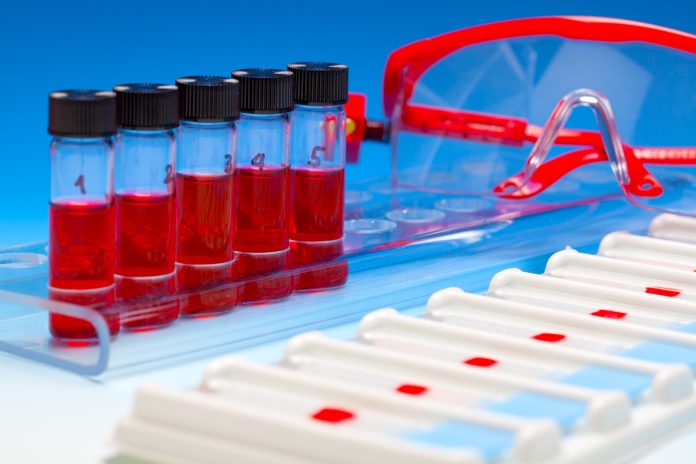
Guardant Health will partner with Radius Health to pursue approvals for Guardant’s Guardant360® CDx liquid biopsy as a companion diagnostic for Radius’ Phase III breast cancer therapeutic elacestrant (RAD1901), through a collaboration whose value was not disclosed.
Elacestrant is a selective estrogen receptor degrader (SERD) being studied in the treatment of advanced ER-positive, HER2-negative breast cancer resistant to CDK4/6 inhibitors in combination with hormone therapy.
Elacestrant is under study in the Phase III EMERALD trial (NCT03778931), being conducted by Radius. The trial, estimated to enroll 466 participants, is designed to compare the efficacy and safety of elacestrant to the standard of care endocrine therapy in the overall population, as well as in patients who have been comprehensively genotyped using the Guardant360 test and harbor ESR1 mutations.
Standard of care options being studied include fulvestrant or an aromatase inhibitor in women and men with breast cancer whose disease has advanced on at least one endocrine therapy including a CDK4/6 inhibitor in combination with AstraZeneca’s marketed Faslodex® (fulvestrant) or an aromatase inhibitor. The trial’s estimated primary completion date is August 2021.
Radius has licensed elacestrant from Menarini Group under a potentially more than $350 million global exclusive development and commercialization licensing agreement announced July 23. Menarini agreed to pay Radius $30 million upfront, up to $320 million tied to achieving development and sales milestones, and tiered, low to mid-teen percentage royalty payments based on global net sales.
Radius continues to conduct the EMERALD trial, and will complete the study through the filing of an NDA with the FDA.
“Given breast cancer’s inherent tumor heterogeneity and the high prevalence of bone metastasis in advanced disease, our Guardant360 liquid biopsy can help overcome the challenges of tissue and bone biopsies to reveal significantly more actionable mutations, including ESR1 mutations, which may play a role in resistance and which are being studied in Radius’ EMERALD trial,” Guardant Health President AmirAli Talasaz, Ph.D., said yesterday in a statement.
Guardant360 uses next-generation sequencing to analyze 74 genes using cell-free tumor DNA from patient blood samples. Guardant360 has received broad coverage by Medicare for use across the vast majority of advanced solid tumors, as well as by many private payers.
Since it was launched in 2014, Guardant360 has been used by more than 7,000 oncologists, over 60 biopharmaceutical companies and all 28 National Comprehensive Cancer Network Centers in the United States.
Guardant has increasingly applied its Guardant360 blood test toward guiding treatment in metastatic breast cancer, as the number of genomic alterations capable of being treated grows.
Guardant360 is one of two marketed Guardant tests focused on detecting cancer in advanced-stage patients. The other is GuardantOMNI®, which was launched in 2017 and is a broader panel measuring 500 genes from ctDNA.
“We continue to believe Guardant is well positioned in the COVID-19 pandemic given its exposure to the advanced cancer market, where patients can’t delay care for an extended period of time,” Puneet Souda, a Senior Research Analyst at SVB Leerink covering Life Science Tools and Diagnostics, wrote June 23 in an investor note. “We believe the market is likely to become more amenable to liquid biopsy as physicians look for ways to get testing and drugs to their cancer patients, who have shown a 30% mortality rate to the virus (according to a recent paper management highlighted).”
Guardant is also developing tests to guide neoadjuvant and adjuvant treatment selection for early-stage cancer patients through its LUNAR program. LUNAR aims to address the needs of early stage cancer patients with, cancer survivors with surveillance, asymptomatic individuals eligible for cancer screening and individuals at a higher risk for developing cancer with early detection.
At the American Association for Cancer Research (AACR) Virtual Annual Meeting II, held June 22-24, Guardant presented data showing improved performance of the LUNAR-2 liquid biopsy to detect early-stage colorectal cancer (CRC) in average-risk adults. In a blinded cohort analysis of 88 colonoscopy screened negative patients and 113 patients newly diagnosed with early stage CRC using a further optimized, integrated genomic and epigenomic analysis, LUNAR-2 showed overall sensitivity of 90.3% and overall specificity of 96.6%, a slight improvement over previously reported data.
The collaboration with Radius is Guardant’s second companion diagnostics partnership to be launched this month.
On July 8, Guardant teamed up with Janssen Biotech to pursue regulatory approval and commercialization of Guardant360 CDx as a companion diagnostic for Janssen’s amivantamab (JNJ-6372) in the U.S., Canada, Japan, and Europe. Amivantamab is an EGFR-MET bispecific antibody being developed to treat non-small cell lung cancer (NSCLC).











